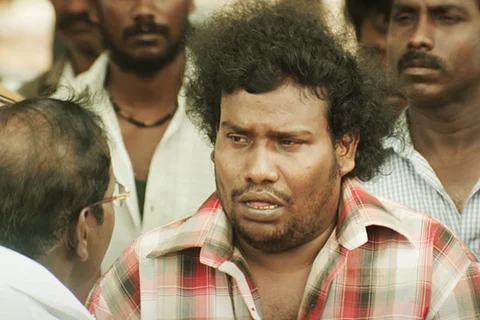

Mandela premiered on television two days before Tamil Nadu was set to vote, and a day before on OTT platform Netflix. The timing could not have been more perfect. The film, directed by debut filmmaker Madonne Ashwin, is a satire on elections and aims to serve as a reminder to the electorate to vote wisely.
Yogi Babu has proved to be a fine actor in films where he has been allowed to perform beyond the usual body shaming comedy. In Mandela, the actor is understated as Smile aka Ilichavayan who goes on to be renamed as Nelson Mandela. The film is set in a Tamil Nadu village called Soorankudy where two warring caste groups, the Vadakkoorans and Therkkoorans, cannot see eye to eye. In the middle of the two fanatic groups is Mandela, a Dalit barber who lives under a banyan tree and is treated as an outcast.
There have been many films in the recent past that have taken on the issue of corruption during elections. Mandela does a far better job than 'political' star vehicles like Vijay's Sarkar or RJ Balaji's message films; the characters are well-written (even the minor ones like Esaki and Giridha), there is more showing than telling, and we genuinely empathise with Mandela and the situation he finds himself in. Sheela Rajkumar plays Thenmozhi, who runs the local post office, and a delicate romance develops between her and Mandela. The barber observing her hiding her white hair carefully and how that thread is picked up later, is particularly moving. The cast, including supporting actors GM Sundar and Kanna Ravi, turn in convincing performances.The comedy too is organic and not slapstick.
However, the premise of Mandela remains the same as the films that came before it. Freebies are bad. Voters are caste fanatics.The onus is on the poor to not sell their votes. There has been a lot of debate and discussions on the 'freebie' culture in Tamil Nadu politics. While privileged sections of society slam it as bribing voters from tax payers' money, others who have benefitted from these schemes say that they are social justice measures that bridge the gap between the haves and the have-nots. Mandela picks the former position while ostensibly telling the story from the perspective of an underprivileged, oppressed man.
The film also takes jibes at voters who sell their valuable vote for a few thousands. This is a common criticism of the public that has been amplified in cinema, and the people taking this money on screen and making a mockery of democracy are also shown to be poor people whose greed ends up ruining the system. But is this the only way in which our democracy is auctioned? Why are the monied, privileged classes who also participate in enabling corruption and the erosion of our institutions never held accountable in the same way? In a country which ranked 94 among 107 countries in the Global Hunger Index 2020, should the onus on cash for votes be on the poor for taking the money or on bodies like the Election Commission which are supposed to rein in political parties from indulging in corruption? For the privileged, selling your democratic right for a paltry Rs 2,000 may seem ridiculous, but what if you or I were offered a few millions or crores? What if it meant paying off a house loan or for your child's foreign degree — would you still hold on to your vote? This is not mere whataboutery; it is for us to think about whether it's really a matter of principle or scale.
The setup of the social milieu of the film itself is quite problematic. While the caste order is hierarchical by its very existence, the two caste groups in the film are shown to be on equal footing in every respect. Their leader, a follower of Periyar, is called Periyavar (Sangili Murugan), and he is presented to us as a good-hearted man who has the village's best interests at heart. Strangely, this also involves him being married to a woman from the Vadakkooran community and another from the Therkkooran community, siring a son with each. We also don't know which caste Periyavar belongs to, and his 'intercaste outreach' through bigamy is never questioned anywhere in the film. Treating women as property or ascribing a status similar to cattle to them does not, apparently, call for censure, even in a film that wants social change. At one point, the film talks about the plight of women who do not have access to toilets — I only wish that sensitivity had seeped through the film's consciousness and had not remained as just another issue to be highlighted.
Mandela is no doubt a well-intentioned film and a welcome relief from the mainstream hero-smashing-corporate-villain mould or worse, the insincere 'farmer' films that are dime a dozen in the Tamil film industry. But for political satires to work, the content really needs to go beyond stating the obvious and providing an insight to the audience.
Watch: Trailer of Mandela
Disclaimer: This review was not paid for or commissioned by anyone associated with the series/film. TNM Editorial is independent of any business relationship the organisation may have with producers or any other members of its cast or crew.